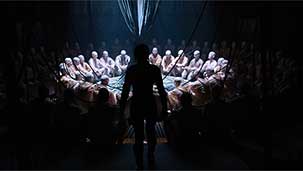As the creator of the original Ghost in the Shell manga, I wonder what you think of all the sturm und drang surrounding the current live action adaptation. I'd love to hear your take on these accusations of whitewashing and cultural appropriation.
But you have chosen to remain silent. Which leaves it to the rest of us, I suppose, to fill the vacuum with our invective.
Counterfactual arguments are often useless. They typically come down to a question that sounds like this: what would this thing be if it were an entirely other thing? In this case: what would Ghost in the Shell be if it starred an Asian actress in the lead role? Would it be better? Better, how? Better in the sense that it would be more sensitive to the significant social and cultural concerns surrounding depictions of different cultures? Certainly. Would it be better, aesthetically? That's less clear, inasmuch as those kinds of evaluations vary by orders of magnitude from person to person. Would culturally appropriate casting have served notice that studios and creatives are finally getting the message that the public want to see more diversity onscreen? Absolutely. Is that incentive enough for fiscally conservative producers to make that leap? It probably should be—but in this case wasn't.
In the midst of all these theoretical questions, however, is the movie that was actually made—so let's talk about that.
You built Ghost in the Shell as a near-future science fiction story about a woman who wakes to find her brain encased in a sophisticated robotic shell—a shell that is almost completely human in appearance (although this is the second film in which Johansson seems to be short on certain key aspects of female anatomy). Initially she has no idea how or why she finds herself in this circumstance, and much of the movie concerns itself with unraveling the truth about her transformation.
Ghost in the Shell happens to be a pretty goddamn good movie. Visually, it's top notch, from production design to the lighting, camera placement, narrative coherence. There are moments of sheer beauty throughout. And Scarlett Johansson is utterly compelling. She knows how to work her physicality for the camera, and is both aloof and authoritative in her presence. Some have taken issue with what they viewed as a stilted performance, but, for me, she conveyed a profound sense of displacement that would seem natural after waking to find yourself literally disembodied. If there is one actress with the very specific chops required to play someone unfamiliar with her current physical shell, it is Scarlett Johansson (see: Under The Skin, Her).
The story itself strays from the anime, and even your manga. Instead of an opaque and meandering examination of the nature of sentience, accented here and there with some violent action beats, it's a much more linear account of the circumstances that lead to Johansson's strange predicament, and who was ultimately responsible. There is also a coda that many found unpalatable, and I can certainly see why. Even though I found it awkwardly well-intentioned rather than malignant—a venal sin rather than a mortal one.
Like many cultural products of its kind, there are many people who view your source material as a sacred text. And while your manga really had some depth, the anime, while beautiful, is often frustrated in its ambitions by the limits of the form in which it's working. It stuffs too much into a too-small space, and ends up tripping over its own ambitions. Still, it's astonishing at times, and takes full advantage of the scale and visual imagination that (until very recently) only anime could manage.
I appreciated the pared down story and linear plot of the live version partly because it allowed the audience to linger on the astonishing cityscapes. The action scenes, too, were well-wrought and crystal clear in their visual logic. I also particularly appreciated the supporting cast; they were uniformly good, but especially Takashi Kitano; every scene he's a part of is made better by the sheer force of his presence.
What struck me, too, was the sense of place – the groundedness – that many CGI-heavy films like this often lack.
But none of the above praise will change the fact that this film is not particularly well regarded in North America. This is a film that will likely not make its money back and will, in the future, probably give pause the next time producers rely on the logic of big (white) star = bolstered receipts.
Ironically, though, in Japan and China and Hong Kong and Taiwan – all these countries that are supposedly suffering the effects of this cultural appropriation – this iteration of Ghost in the Shell is doing quite well, both critically and at the box office. Which leads me back to my original question.
What do you think?
Sincerely,

Tim







